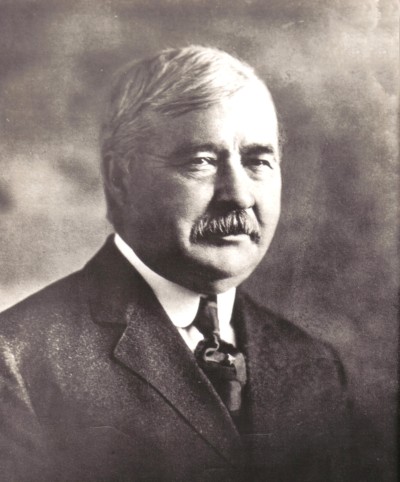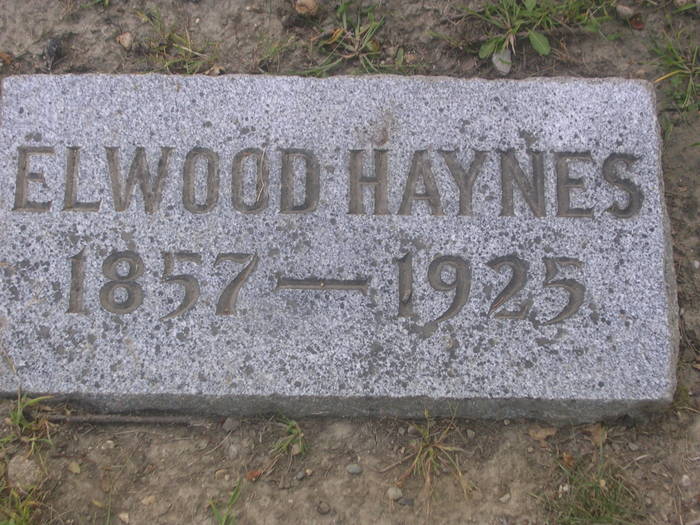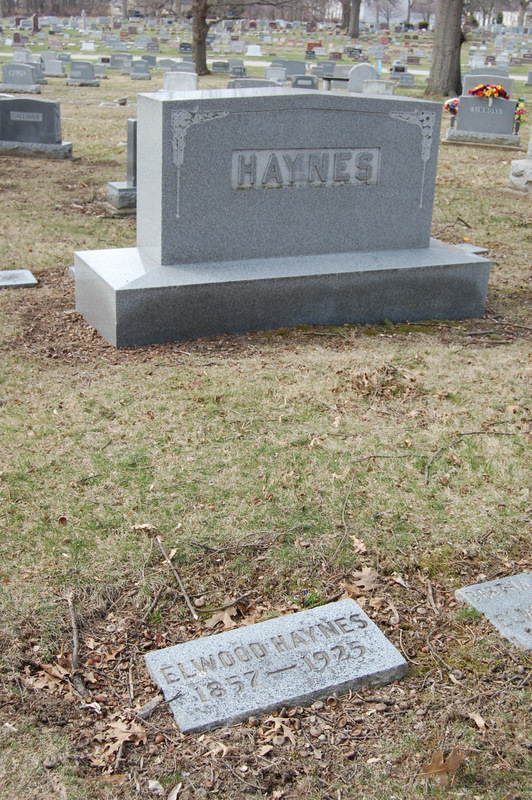Elwood Haynes (Elwood Haynes)

Elwood Haynes (October 14, 1857 – April 13, 1925) was an American inventor, metallurgist, automotive pioneer, entrepreneur and industrialist. He invented the metal alloys stellite and martensitic stainless steel and designed one of the earliest automobiles made in the United States. He is recognized for having created the earliest American design that was feasible for mass production and, with the Apperson brothers, he formed the first company in the United States to produce automobiles profitably. He made many advances in the automotive industry. Early in his career, while serving as a field superintendent at gas and oil companies during Indiana’s gas boom, Haynes invented several devices important to the advance of the natural gas industry. When working for the Indiana Natural Gas and Oil Company, he oversaw the construction of the first long-distance natural gas pipeline in the United States, connecting Chicago with the Trenton Gas Field 150 miles (240 km) away. He began to formulate plans for a motorized vehicle in the early 1890s; he successfully road tested his first car, the Pioneer, on July 4, 1894—eight years after the first automobile was patented in Germany. He formed a partnership with Elmer and Edgar Apperson in 1896 to start Haynes-Apperson for the commercial production of automobiles, and he renamed it Haynes Automobile Company in 1905, following the loss of his partners.
Working in his laboratory to develop new corrosion-resistant metals for auto parts, Haynes discovered that mixing tungsten with chromium, steel and iron resulted in the formation of strong and lightweight alloys that were impervious to corrosion and could withstand very high temperatures. In 1912, he formed Haynes Stellite Company to produce one of the new alloys and received lucrative contracts during World War I, making Haynes a millionaire in 1916. He sold his patent for stainless steel to the American Stainless Steel Company in exchange for enough stock to gain a seat at the company’s board of directors, a position he held for twelve years. He merged the Haynes Stellite company with Union Carbide in 1920, and after passing through different owners, the company was renamed and is now called Haynes International. Haynes returned his focus to his automotive company, but in the economic recession of the 1920s the business went bankrupt and was liquidated. An outspoken advocate of prohibition, he made substantial donations to the Prohibition Party and Indiana’s prohibitionist leader Frank Hanly. Haynes ran an unsuccessful campaign in Indiana for the U.S. Senate in 1916 as a prohibition candidate and remained active in the party until prohibition became law. Later, he became a philanthropist and served two terms as president of the YMCA, five years on the Indiana Board of Education, and was an active member of the Presbyterian church. After his death from complications arising from influenza, his Kokomo mansion was converted into the Elwood Haynes Museum and is open to the public where many of his original inventions and automobiles are on display.
On January 6, 1925, Haynes, the Apperson brothers, and other automotive pioneers were awarded gold medals by the National Automobile Chamber of Commerce at a New York City auto exhibition for their contributions to the industry. On his return trip home, he contracted influenza and his health began to deteriorate rapidly. In March, he asked his son to take over his business interests while he traveled to Florida to seek rest in the warmer climate. His condition steadily worsened, causing him to cancel his planned trip to Cuba and return to Kokomo. He remained in his home, attended by his personal physician and a nurse until his death from congestive heart failure on April 13, 1925. Haynes’ funeral was held in Kokomo before his interment at the city’s Memorial Park cemetery. Haynes’ fortune had shrunk considerably with the collapse of his auto company. He still held an estimated $2.85 million ($35 million in 2009 chained dollars) in stocks, bonds, and other assets, but almost all of his cash savings were gone. He had already been forced to borrow money using future dividends and royalties as collateral, leaving his family with some difficulty in coming up with funds to maintain his home. Haynes’ estate was left to his wife who continued to live in the family mansion until her own death from a stroke in August 1933. The family assets were distributed between Bernice and March who separately oversaw their portion of the family’s interests. March inherited the family mansion, but sold it in 1957 to Martin J. Caserio, General Manager of the Delco Electronics Division of the General Motors Company who lived there until he was transferred to Detroit in 1964. General Motors purchased the house from Caserio at that time so that he could purchase a home in Detroit. GM maintained ownership for about a year (it was vacant) and then sold the mansion in 1965 to Bernice, who donated it to the city of Kokomo. The city converted it into the Elwood Haynes Museum and it has been open to the public since 1967. In January 1944 the SS Elwood Haynes, a Liberty Ship built during World War II, was named in Haynes’ honor. Haynes is remembered as a pioneer of the American automobile, and as the creator of the first automobile design viable for mass production. He is credited as being one of those primarily responsible for the rapid growth of the natural gas industry in Indiana, a boom that made northern Indiana one of the leading industrial regions of the United States. He is also remembered for his development of stainless steel and stellite, materials that are commonly used across the world today. Stellite remains an important metal, as its ability to withstand high temperatures has made it a component in American spacecraft. Haynes is the grandfather of Margaret Hillis, founder and director of the Chicago Symphony Chorus, and Elwood Hillis, an eight term Congressman representing Indiana’s 5th District.
Born
- October, 14, 1857
- USA
- Portland, Indiana
Died
- April, 13, 1925
- USA
- Kokomo, Indiana
Cause of Death
- congestive heart failure
Cemetery
- Kokomo Memorial Park Cemetery
- Kokomo, Indiana
- USA



